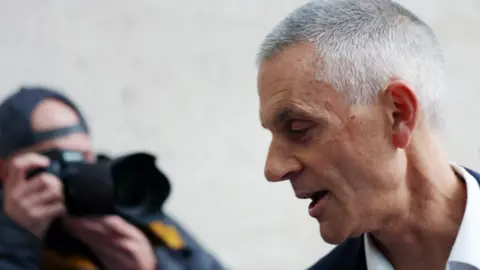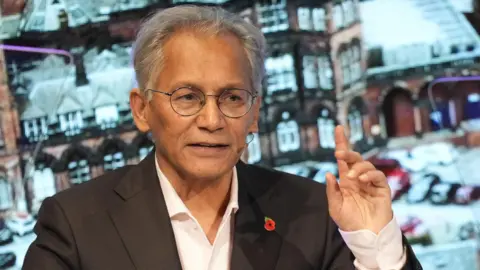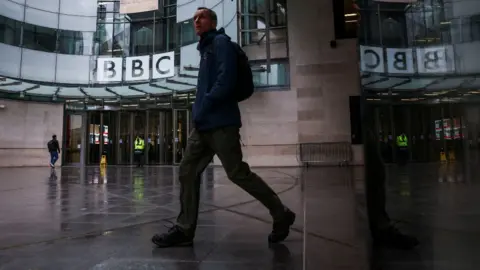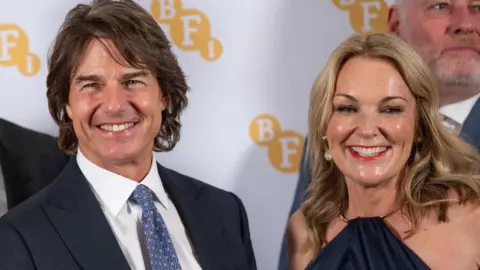
Katie Razzall,culture and media editor and
Steven McIntosh,entertainment reporter, with additional reporting
 BBC
BBCThe full story of what exactly precipitated the downfall of the BBC’s director general and his CEO of News is probably still emerging.
But one part of it, to my mind, isn’t in question: Tim Davie’s explanation that one of his main reasons for resigning was the human toll that five years in the job (and, presumably, particularly the difficult, error-filled past year) have had on him.
In his resignation email to staff, he wrote of “the very intense personal and professional demands of managing this role over many years in these febrile times”.
On a human level, it’s relentless. But there are plenty who – perhaps understandably – have little sympathy for the outgoing DG.
They point out that the job is highly remunerated (it is), brings many perks with it (it does) and that there were just too many mistakes on his watch.
Every time a story has blown up (most recently, two Gaza documentaries, Bob Vylan at Glastonbury, and now a misleading edit of a presidential speech), I have immediately been messaged by journalists outside the BBC. The question is always the same. “Surely this time the DG has to go?”
Whatever the arguments over individual crises, we live in a ‘hunting for a scalp’ media culture.
And when it comes to finding Davie’s replacement, the words of the BBC chairman Samir Shah have stayed with me.
“This is not an easy job to fill, it really isn’t,” he told staff on Tuesday. “And I have to be honest, the way we as a country attack people, really personally, is not good.
“Why would somebody want to do this job if that’s what they face? We’re asking a lot of a director general.”
 PA Media
PA MediaHe’s right – and whoever takes on the job next will know the odds aren’t great that they will make it through unscathed. Three of the last five permanent DGs have resigned following scandals.
One person said to me: “If that’s what it’s like, the number of people prepared to do the job won’t be many.”
Although all newsrooms make mistakes, when the BBC does, it often results in pressure on its editor-in-chief – the director general.
One media executive said to me that the volume of output generated by the BBC makes it impossible for the DG to be across it all, but “inevitably at any one moment somebody is doing something really stupid”. In the end, those mistakes can sink a DG because they have ultimate responsibility.
‘Still the biggest job in British broadcasting’
Davie was paid about £530,000 a year for his trouble – but that is less than he’d have made heading up a big commercial service.
However, for the right candidate, it could equally be an enticing moment to join the BBC as it heads into negotiations with the government over its new royal charter, which will determine its future.
“It’s a difficult time to be leading the BBC, but it’s also an exciting time,” says Deadline’s international TV editor Max Goldbart, who has been reporting on the corporation’s crises this week.
“The charter renewal is about to happen, criticism is coming from all fronts, but if you’re able to push through this then you could be seen as the person who led the BBC through difficult times in the modern streaming era.”
Goldbart says it is still “the biggest job in British broadcasting”.
“It remains an influential position which has a lot of prestige attached to it… although that prestige has probably dropped over the last five years.”
 Reuters
ReutersGoldbart thinks there will be people who are up for the fight.
Of course that’s right. But the pool of people with the right combination of skills is actually more of a small puddle.
The role calls for experience in creative leadership, a tight grip on editorial issues, knowledge of running a large administration, political nous, experience of commercial affairs, and a grasp of the global media perspective.
There aren’t many people (if any) who tick every box – which is why some people feel the job is now too big for one person to take on. There have even been calls for it to be split.
Inside the BBC, some are saying there could be one leader in charge of programming and strategy, and a separate editor-in-chief or deputy director general responsible for news and current affairs.
Giving someone else responsibility for news and current affairs, which is where many of the recent BBC scandals originated, could significantly help a director general’s chances of survival.
However, my sense is that the BBC only works with one person at the very top with final oversight.
Who could be the new BBC director general?
 Getty Images
Getty Images- Jay Hunt – The former BBC One controller has also worked as Channel 4’s chief creative officer and director of programmes at channel 5, and is currently creative director for Apple in Europe
- Alex Mahon – Recently left her role as CEO of Channel 4 to become chief executive of Superstruct Entertainment
- Charlotte Moore – The BBC’s former head of content left the corporation earlier this year to become chief executive of production company Left Bank Pictures
- Dame Carolyn McCall – Formerly the chief executive of EasyJet, now the chief exec of ITV
- Kate Phillips – The BBC’s current chief content officer makes her the the likely internal frontrunner
- Anne Mensah – Has worked at the BBC and Sky and is currently Netflix’s vice president of content
- Sir Mark Thompson – Could the BBC DG from 2004 to 2012, who has since taken on tough challenges in the US as boss of the New York Times and CNN, return?
Other possible candidates include BBC Studios chief Tom Fussell, All3Media CEO Jane Turton, RTE’s director general Kevin Bakhurst, Sky CEO Dana Strong and Channel 4’s chief content officer Ian Katz.
Ex-BBC head of news James Harding, former ITV chairman Sir Peter Bazalgette, Washington Post CEO Will Lewis, TV presenter and executive Sir Trevor Phillips and broadcaster Andrew Neil have also been suggested. BBC presenters Nick Robinson and Amol Rajan have even been mentioned.
Additional reporting by Ian Youngs.







